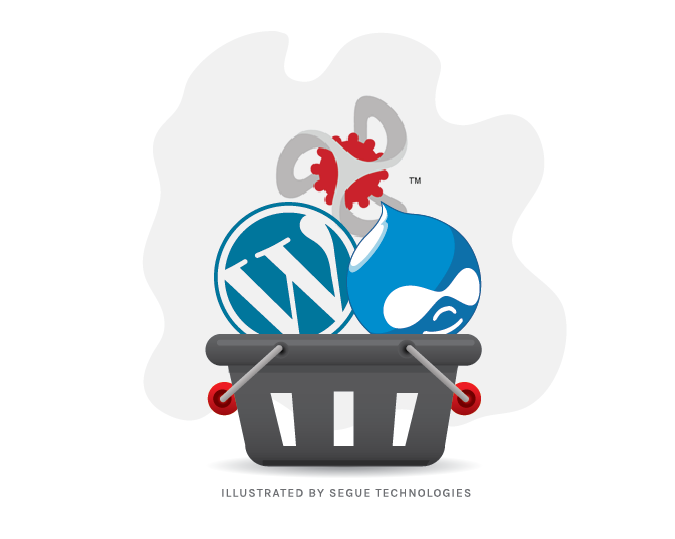Hopefully you have an understanding of what a Content Management System is and why it’s worth the investment. If you need to refresh your knowledge on CMS checkout Todd Godbout’s blog, “What is a Content Management System (CMS) and is it worth the investment?” to get up to speed.
In this blog you’ll be introduced to some of the best and most widely used content management systems on the web. The best part about a CMS is that it doesn’t require you to have a large technical background to use it to maintain and update your website content. A large majority of them are simple and easy to use and offer a diverse set of functionalities that fit your needs. A CMS allows you to have a dynamic and informative website while minimizing your long term website development and maintenance costs. Let’s take a look at some of the top CMS contenders across the web: Drupal, WordPress, and DNN.
Drupal
Drupal is an open source, database-backed, web platform with a large community of developers from around the world. A big draw of this product is that it is free to purchase. However, its costs are usually associated with customization and implementation vs. licensing fees. Using Drupal requires little to no web application development knowledge and can be maintained fairly easily with file maintenance tools. You can implement hundreds of themes from the Drupal website, or design your own, and there are thousands of add-on modules to assist with site customization. Some of these modules include a Search Engine Optimization (SEO) compliance checker, Facebook Social Integration, a Twitter module for associating twitter accounts with Drupal user accounts, a URL shortening module for easy URL copying, a Google Analytics module to track your sites traffic and page logistics, and a Metatags module to help search engines pick up on keywords from your site.
Drupal is a content-driven, multi-user system that allows users to log in based on access levels. As an administrator, you can decide what content types particular users are allowed to access, and enable user roles to control your content workflow. Drupal can host and promote your content to some of the most popular social outlets, extending your web presence on Facebook, Twitter, and many other well-known social media sites.
Drupal websites are some of the most secure websites. Security is tested regularly by both the Drupal community and security experts around the world. Government agencies, large corporations, news, non-profit, and many schools districts and higher education institutions deploy their sites using Drupal. We even use Drupal as our Content Management System for the Segue website.
WordPress
WordPress, licensed under the GPLv2 (or later), is one of the most popular content management systems. WordPress is a multi-user and multi blogging system. Multi blogging allows you to run more than one installation of WordPress on one domain. This functionality in WordPress enables each website to host its own blogging community with the ability to handle administrative tasks from a single dashboard. Primarily used as an open-source, self-hosted, blogging tool built on PHP and MySQL, there are currently over 70 million WordPress sites in the world. WordPress sites are customizable to meet the specific needs of users, with over a thousand different free and paid themes. You can also go from a simple blog to a fully integrated CMS site by downloading and installing plugins and widgets from the wordpress.org site.
WordPress is optimized to operate on all major mobile and tablet devices with the latest operating systems. WordPress mobile capabilities lets users stay connected to their content while on the go. Users can create new content, comment on blogs, and moderate existing blogs while waiting on a fresh slice of pizza from Lost Dog Cafe.
DNN (formerly DotNetNuke)
DNN is a robust content management system built on Microsoft .NET. This CMS has a widely publicized open-source community that is licensed through MIT, as well as commercial licensing for its professional and enterprise software. DNN works dynamically to provide content for commercial websites, social intranets, partner extranets, and community portals. With over 8 million downloads, DNN is run on 750,000 different websites around the world, including three for United Negro College Fund (UNCF) business units, developed and deployed by Segue.
DNN uses a skin architecture, which simplifies development for web designers by separating the design and the content. The skin framework consists of HTML files, menus, images, CSS, and JavaScript. DNN utilizes a host of modern client-side web tools like CSS3, HTML 5 and jQuery.
There are hundreds of other content management systems available with functionalities to meet your needs and beyond, but be mindful of how user-friendly the CMS is for you. You don’t want to spend hours trying to figure out how to modify content, or pull out your hair trying to figure out why a user developed theme doesn’t match your existing menu navigation after it’s already implemented. Make sure the CMS has all of the capabilities that work for you, even if it isn’t one of the most widely used content management systems. Don’t just be another page on the web filled with ads and cumbersome blocks of content. Provide a user experience and build a web presence that makes sense.
